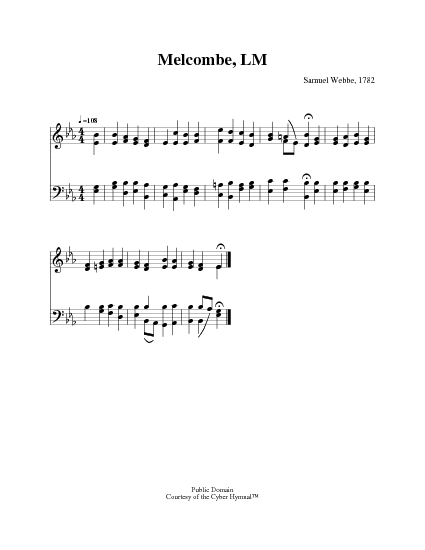- |
User Links
New every morning is the love

New every morning is the love
Author: John Keble (1822)Tune: MELCOMBE (Webbe)
Published in 365 hymnals
Printable scores: PDF, MusicXMLAudio files: MIDI
Representative Text
1 New ev'ry morning is the love
our waking and uprising prove;
through sleep and darkness safely brought,
restored to life and pow'r and thought.
2 New mercies, each returning day,
hover around us while we pray;
new perils past, new sins forgiv'n,
new thoughts of God, new hopes of heav'n.
3 If on our daily course our mind
be set to hallow all we find,
new treasures still of countless price,
God will provide for sacrifice.
4 Old friends, old scenes will lovelier be,
as more of heav'n in each we see;
some sof'ning gleam of love and prayer
shall dawn on ev'ry cross and care.
5 The trivial round, the common task,
will furnish all we ought to ask:
room to deny ourselves, a road
to bring us daily nearer God.
6 Only, O Lord, in Thy dear love
fit us for perfect rest above;
and help us, this and ev'ry day,
to live more nearly as we pray.
Source: Our Great Redeemer's Praise #333
Author: John Keble
 Keble, John, M.A., was born at Fairford, in Gloucestershire, on St. Mark's Day, 1792. His father was Vicar of Coln St. Aldwin's, about three miles distant, but lived at Fairford in a house of his own, where he educated entirely his two sons, John and Thomas, up to the time of their entrance at Oxford. In 1806 John Keble won a Scholarship at Corpus Christi College, and in 1810 a Double First Class, a distinction which up to that time had been gained by no one except Sir Robert Peel. In 1811 he was elected a Fellow of Oriel, a very great honour, especially for a boy under 19 years of age; and in 1811 he won the University Prizes both for the English and Latin Essays. It is somewhat remarkable that amid this brilliantly successful career,… Go to person page >
Keble, John, M.A., was born at Fairford, in Gloucestershire, on St. Mark's Day, 1792. His father was Vicar of Coln St. Aldwin's, about three miles distant, but lived at Fairford in a house of his own, where he educated entirely his two sons, John and Thomas, up to the time of their entrance at Oxford. In 1806 John Keble won a Scholarship at Corpus Christi College, and in 1810 a Double First Class, a distinction which up to that time had been gained by no one except Sir Robert Peel. In 1811 he was elected a Fellow of Oriel, a very great honour, especially for a boy under 19 years of age; and in 1811 he won the University Prizes both for the English and Latin Essays. It is somewhat remarkable that amid this brilliantly successful career,… Go to person page >Text Information
Related Texts
| First Line: | New every morning is the love |
| Author: | John Keble (1822) |
| Meter: | 8.8.8.8 |
| Language: | English |
| Notes: | French translation: "Animé d'un nouvel amour" by Flossette Du Pasquier; German translation: "O Gottes-liebe, wie getreu" by Erwin Kleine |
| Copyright: | Public Domain |
English
- A Book of Hymns and Tunes: for the Sunday-School, the Congregation and Home: 2nd ed. #130
- A Church Hymn Book: for the use of congregations of the United Church of England and Ireland #183
- A Church of England Hymn Book: adapted to the daily services of the Church throughout the year #6
- A Collection of Hymns and Sacred Songs: suited to both private and public devotions, and especially adapted to the wants and uses of the brethren of the Old German Baptist Church #115
- A Collection of Hymns: Supplementary to the Psalms and Hymns of Dr. Watts #153
- A Handy Book of Old and Familiar Hymns #35b
- A Hundred Songs of God and His Kingdom #d48
- A Hymnal and Service Book for Sunday Schools, Day Schools, Guilds, Brotherhoods, etc. #123
- A New Hymnal for Sunday Schools #81
- A School Service Book #d100 10 shown out of 267
French
German
Tune
MELCOMBE (Webbe)Also known as: ST. PHILIPS BENEDICTION GRANTON NAZARETH MELCOMBE was first used as an anonymous chant tune (with figured bass) in the Roman Catholic Mass and was published in 1782 in An Essay on the Church Plain Chant. It was first ascribed to Samuel Webbe (the elder; b. London, England, 1740; d.…
CANONBURY
Derived from the fourth piano piece in Robert A. Schumann's Nachtstücke, Opus 23 (1839), CANONBURY first appeared as a hymn tune in J. Ireland Tucker's Hymnal with Tunes, Old and New (1872). The tune, whose title refers to a street and square in Islington, London, England, is often matched to Haver…
Timeline
Arrangements
Media
The Hymnal, Revised and Enlarged, as adopted by the General Convention of the Protestant Episcopal Church in the United States of America in the year of our Lord 1892 #1
- Melcombe (XML)


 My Starred Hymns
My Starred Hymns




